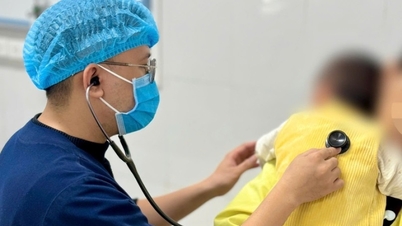Ms. Vo Xuan Tam (60 years old, living in Ho Chi Minh City) was admitted to Thong Nhat Hospital (Ho Chi Minh City) in an emergency with severe pneumonia and had to use a ventilator.
It is known that before that, her health was completely normal, without any warning signs. “I was taking a nap when I suddenly felt short of breath, tears welled up in my eyes. My family helped me sit up but I was still having difficulty breathing. Seeing this, my family quickly called an ambulance. All the way to the hospital, I had to use oxygen.” Mrs. Tam said.
Currently, the Respiratory Department of Thong Nhat Hospital is overloaded due to the sudden increase in respiratory cases. Every day, the unit receives nearly 100 cases of respiratory diseases, many of which have severe complications and require ventilators.
Many patients are hospitalized late, when they have respiratory failure complications, so they need long-term treatment, using invasive or non-invasive mechanical ventilation.
In addition, some cases have complex underlying diseases or are on immunosuppressive treatment, making infection control more difficult.

Doctor CKII Ngo The Hoang, Head of Respiratory Department, Thong Nhat Hospital, Ho Chi Minh City said: “The erratic weather, especially during the changing seasons, reduces the body's resistance, creating favorable conditions for respiratory viruses and bacteria to develop. This is the main cause of the increase in diseases such as flu, sore throat, bronchitis or pneumonia.”
In addition, air pollution, dust and cigarette smoke in big cities also aggravate chronic respiratory diseases such as asthma or chronic obstructive pulmonary disease.
Currently, seasonal influenza viruses (Influenza A, B), pneumococcus and H. influenzae bacteria are circulating strongly, causing many cases of severe pneumonia. Those most severely affected are the elderly, especially those with underlying diseases such as high blood pressure, diabetes, heart failure or chronic obstructive pulmonary disease.
In addition, people with weakened immune systems due to chronic diseases or long-term corticosteroid use are also vulnerable. Pregnant women and young children are at high risk of severe respiratory infections.

According to Dr. Ho Quoc Khai, Deputy Head of the Department of Internal Medicine and Respiratory Medicine, Gia Dinh People's Hospital, common respiratory diseases during this time include pharyngitis, bronchitis, pneumonia, as well as acute episodes of chronic lung diseases such as bronchial asthma, chronic obstructive pulmonary disease or bronchiectasis.
Most patients have warning symptoms such as sore throat, cough, fever. However, some cases of sudden difficulty breathing without warning signs can easily lead to respiratory failure, with the risk of serious life-threatening complications.
Doctors warn that when the weather changes from hot to cold or changes suddenly, the risk of respiratory diseases increases. People need to proactively keep their bodies warm, especially the neck, chest, back and feet.
Closed, humid, and poorly ventilated environments create favorable conditions for bacteria to grow, increasing the risk of respiratory infections. In cold regions, when using coal for heating, ventilation should be opened to avoid carbon monoxide poisoning - the cause of many cases of serious respiratory injuries.
People should absolutely not be exposed to risk factors such as alcohol, beer, cigarettes or dust, especially honeycomb coal smoke. Maintaining a healthy lifestyle, exercising regularly, keeping personal hygiene and keeping teeth clean are simple but effective measures to prevent disease. When there are signs of rhinitis or pharyngitis, it is necessary to see a doctor and get treatment early to avoid complications spreading to the lungs.
To prevent pneumonia, asthma or acute exacerbations of chronic lung disease, people should get vaccinated against influenza every year, especially before the peak periods in March-April and September-November. People with chronic diseases such as asthma or chronic obstructive pulmonary disease should follow their doctor's instructions and not stop taking their medication when their symptoms improve.
Source: https://baolangson.vn/canh-bao-suy-ho-hap-o-nguoi-lon-tuoi-trong-mua-mua-lanh-5064294.html




![[Photo] Cutting hills to make way for people to travel on route 14E that suffered landslides](https://vphoto.vietnam.vn/thumb/1200x675/vietnam/resource/IMAGE/2025/11/08/1762599969318_ndo_br_thiet-ke-chua-co-ten-2025-11-08t154639923-png.webp)

























![[Photo] "Ship graveyard" on Xuan Dai Bay](https://vphoto.vietnam.vn/thumb/1200x675/vietnam/resource/IMAGE/2025/11/08/1762577162805_ndo_br_tb5-jpg.webp)








![[Video] Hue Monuments reopen to welcome visitors](https://vphoto.vietnam.vn/thumb/402x226/vietnam/resource/IMAGE/2025/11/05/1762301089171_dung01-05-43-09still013-jpg.webp)






































































Comment (0)